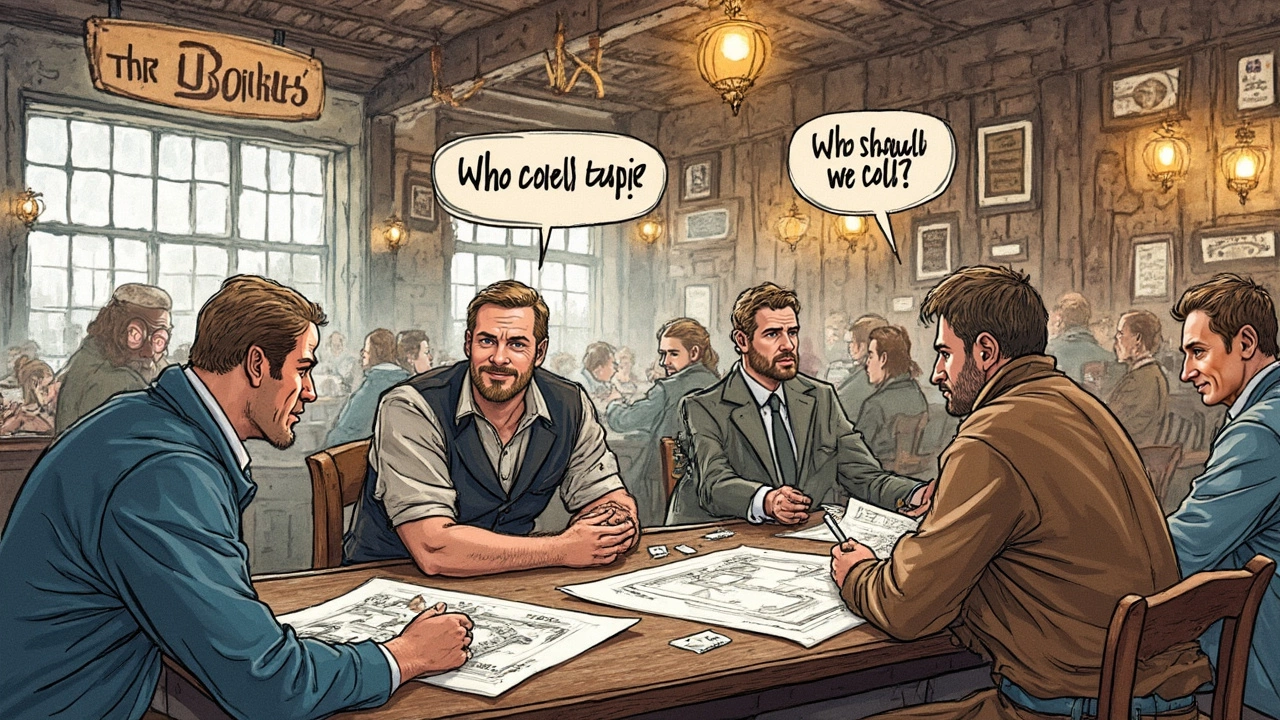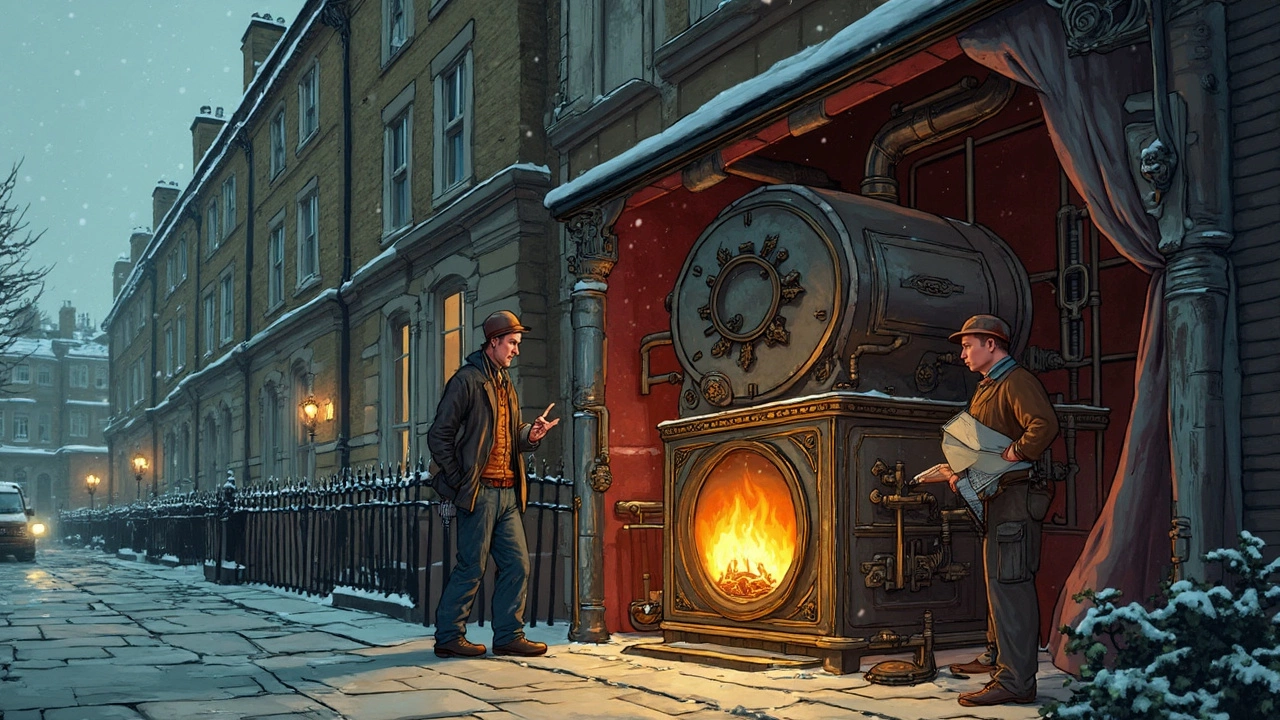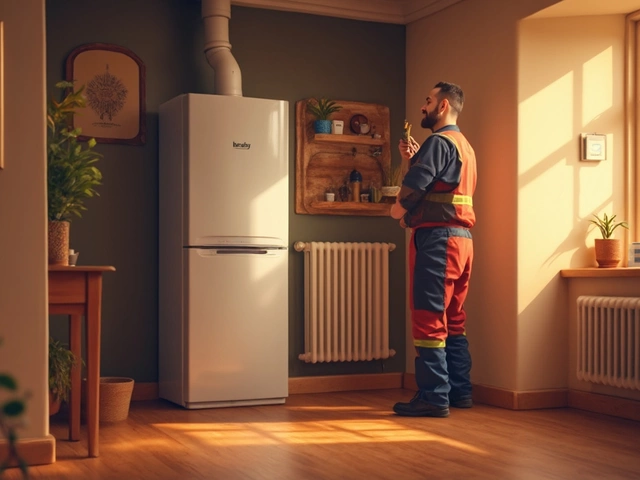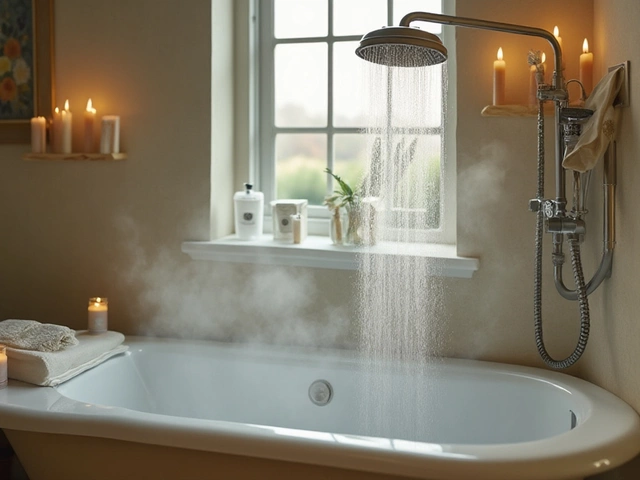When your boiler throws a fit on a frosty winter morning, you're probably wondering whether a plumber ought to be your hero. It's a fair question since boilers deal with both water and heating, putting them in an odd spot between standard plumbing duties and the realm of heating, ventilation, and air conditioning (HVAC) work.
But, can a plumber actually fix your boiler? Turns out, it's not always a straightforward yes or no. While many plumbers have a good grip on the basics of how boilers work, there are nuances that might require an HVAC specialist, especially if your boiler is newer and packed with technology. Boilers can be temperamental, with parts that require specialized knowledge to repair safely and effectively.
Here’s what you need to know: If it's something like a leaking pipe or a minor water issue, a plumber might be able to sort things out. But, when it comes to complex mechanical problems or electrical components, an HVAC tech might be more your speed. Keeping your boiler well-maintained is crucial too, as regular check-ups can often prevent those panicked calls for help.
- Plumbers vs. HVAC Technicians
- Common Boiler Issues
- When to Call a Plumber
- Choosing the Right Professional
Plumbers vs. HVAC Technicians
When it comes to fixing your boiler, you might find yourself torn between calling a plumber or an HVAC technician. Both professions have overlapping skills but there are key differences in expertise that can make one more suitable for certain issues.
What Does a Plumber Do?
Plumbers are experienced in dealing with pipes, water systems, and various fittings. They've got a knack for handling anything related to water, from faucets to sewer lines. So, when your boiler springs a leak or there’s an issue with the pipes attached to it, they’re your go-to professionals.
The Role of HVAC Technicians
HVAC technicians, on the other hand, specialize in heating, ventilation, and air conditioning systems. They are more equipped to deal with the mechanical and electrical components of boilers. If the problem involves the heat exchanger, thermostat, or if your boiler just won’t turn on, an HVAC tech’s expertise might be vital.
Training and Certification
Plumbers typically undergo different certification and training focused on maintaining plumbing systems, while HVAC techs have in-depth training on heating systems. Depending on your region, HVAC professionals might need specific licenses to handle refrigerants or gas lines in boilers, adding an extra layer of safety and compliance.
| Aspect | Plumber | HVAC Technician |
|---|---|---|
| Water Leaks | Expert | Moderate |
| Heating Issues | Basic | Expert |
| Electrical Problems | Basic | Expert |
| Gas Lines | Varies | Licensed |
Deciding Whom to Call
Choosing whether to call a plumber or an HVAC technician can depend on the specific issue and complexity. For small leaks, basic maintenance, or water pressure issues, a plumber might be the faster, more economical option. For more technical malfunctions or if your heating system goes haywire, lean towards an HVAC technician to ensure the problem is resolved safely and efficiently.
Knowing these differences helps you pick the right pro without hesitation, saving both time and bucks.
Common Boiler Issues
Boilers might seem like quiet workhorses in your home, but when things go out of whack, they sure make themselves known. Understanding some of these common ailments can help you decide when to pick up the phone and call a plumber or an HVAC tech.
1. The Infamous No-Heat Situation
Been there, felt that! A total lack of heat is frustrating and often occurs when the thermostat is faulty or the pilot light has gone out. Other culprits could be airlocks or a failure in the motorized valves. Calling in the right help can save you from a chilly dilemma.
2. The Boiler is Noisy
Rattles, bangs, and whistles could mean kettling. It sounds funny, but kettling's no joke. It's caused by limescale buildup which obstructs water flow, leading the water to overheat and boil—just like a kettle. Fixing it often involves a flush out or using special chemicals.
3. Dripping and Leaking
Leaks can spring from pressure valve issues or sometimes corrosion in the pipes. A plumber might be able to patch things up, but it's crucial to find the root cause to prevent future leaks.
4. Strange Pressure Readings
If the pressure gauge dips or climbs erratically, you might be dealing with a faulty pressure relief valve or a hidden leak. Boilers should maintain a steady pressure, usually around 1 to 1.5 bars when cold. Sudden drops or spikes shouldn't be ignored.
5. Pilot Light Problems
In older boilers, the pilot light could flicker out due to a broken thermocouple or even a draught extinguishing it. It's a relatively simple fix but an annoying one if you rely on classic boilers.
Quick Check Table
Here's a quick look at some stats you might be interested in to see how common these problems actually are:
| Issue | Frequency |
|---|---|
| No Heat | 40% |
| Noisy Boiler | 25% |
| Drip/Leak | 15% |
| Pressure Problems | 10% |
| Pilot Light | 10% |
Having a handle on these issues means you can tackle them quickly, avoiding bigger headaches down the line. Keeping tabs on your heating system could make all the difference.

When to Call a Plumber
So, when should you actually pick up the phone and call a plumber for your boiler? It's not always as clear-cut as we'd like, but there are a few scenarios where a plumber is just the person you need.
Leaky Pipes and Water Supply Issues
If you find water pooling around your heating system or notice leaks in the pipes leading to your boiler, it's time to call in a plumber. Plumbers specialize in all things water-related, and they have the tools and skills to tackle those annoying leaks or breaks in the piping systems.
Low Pressure or Water Flow Problems
Facing strange drops in water pressure? This could point to an issue within the boiler's water supply line or a blockage somewhere in the system. Plumbers deal with these kinds of issues regularly and can ensure everything flows smoothly again without causing more headaches down the line.
Hot Water Troubles
Nothing worse than a surprise cold shower, right? If your boiler is heating your water inconsistently or not at all, there could be an issue with your system's connections. A plumber can pinpoint where things are going awry and fix it up so you can enjoy a no-sweat shower once again.
General Maintenance
Getting regular check-ups can prevent surprise problems later on. Plumbers can perform routine maintenance on the water components of your boiler which might help catch minor issues before they balloon into major ones.
Remember, when you call a plumber for your boiler repair, it’s generally to handle the water-based hiccups. If you're dealing with anything more complex or electric-specific, like a broken thermostat or strange noises, you might need to ring up an HVAC specialist instead.
Choosing the Right Professional
When it comes to fixing a boiler, it's not just about opening up the phone book and dialing the first number you see. There's a method to finding the right person for the job, and it could save you both time and money.
Understanding Qualifications
First, let's talk about qualifications. While both plumbers and HVAC technicians often have the skills to manage boiler repair, their education and certifications matter. Plumbers are knowledgeable about water systems and the fundamental components of heating, but HVAC specialists go through specific training for heating systems, giving them an edge in more complex cases.
Licensing and Certification
For anyone working with heating systems, licensing is key. Most regions require HVAC techs to hold specific licenses that certify their ability to handle gas lines and electrical components in boilers. Always ask your technician to show their credentials before hiring them. Certifications from organizations like NATE (North American Technician Excellence) can also be indicators of a tech’s expertise.
Experience Counts
Nothing beats hands-on experience. Whether it's a plumber or an HVAC professional, look for someone with a solid track record in dealing with boilers. Check reviews or ask for recommendations from friends and family. A seasoned pro is more likely to diagnose issues quickly and get your system running smoothly.
Get an Estimate
Before committing, it's wise to ask for an estimate. A reputable professional will want to take a look at your system before giving a precise number. Some companies offer free evaluations, and it's a great chance to get a feel for their reliability and professionalism.
Weighing Costs and Services
If you're still unsure, consider creating a small comparison table of costs:
| Service | Average Cost |
|---|---|
| Basic Plumbing Repair | $100 - $300 |
| Boiler-Specific HVAC Service | $150 - $450 |
Make sure the price includes all necessary parts and labor before agreeing. This prevents surprises later on.
In the end, the choice between a plumber and an HVAC expert largely depends on the specific issue and the complexity of your heating system. By doing your homework and asking the right questions, you'll feel confident that you're putting your boiler in the right hands.





